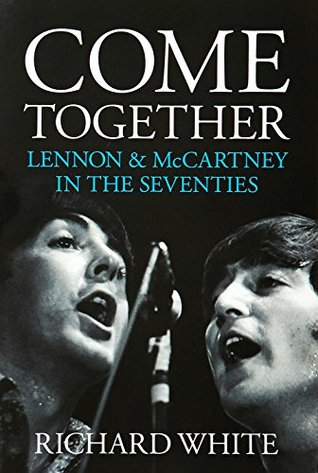
(book review) RICHARD WHITE – Come Together – Lennon & McCartney in the Seventies
- by J.N.
- Posted on 09-03-2018
Label:
Omnibus Press
Rating:
3.5 / 6
Richard White’s book on the somewhat mythologized and strangely compelling relationship between the Beatles legends that are John Lennon and Paul McCartney is an interesting albeit uneven affair. The great thing about this 308-page book is that it offers a fascinating insight into the two men’s internal relationship and creative bond during the aforementioned decade and how often those things have been misrepresented or simply exaggerated in a rather negative way in print ever since then. To some, Lennon and McCartney’s relationship was fraught with rivalry, legal problems, musical differences, and opposite lifestyles, but White paints a much more nuanced picture that is filled with shades of grey. There may have been snide remarks in the press, rumors, speculation, and suspicion all around, but White’s book digs deeper and uncovers an entirely different story that speaks of how two friends, or creative partners, if you will, stayed in touch and still held warm and affectionate feelings for each other as well as their collective musical body of work. “Come Together” also discusses and touches on their individual struggles and problems, their recordings and albums, and how they generally fared following the dissolution of The Beatles both in the studio and in private. There are countless colorful, humorous, and uplifting anecdotes by some of the musicians (and session cats) that worked with either Lennon or McCartney post-Beatles and they offer a most interesting glimpse into the creative worlds that the two gentlemen inhabited and what made them tick when it came to fleshing out song material. What I enjoyed the most were the interviews with drummer Jim Keltner who recorded and performed with John Lennon and George Harrison. Those were both enlightening and moving to immerse oneself in. What also works in its favor is the fact that the book primarily focuses on what went on in New York City, New Orleans, and Los Angeles, and one could argue that those renowned cities figure as interesting backdrops to the entire narrative and that they almost attain roles of their own to a certain extent.
What disappoints yours truly about this book is that it is neither well-written nor fluid, which is to say that it is clumsily written in places and contain too many repetitions and redundant sections and paragraphs. In that sense, it feels like an ordeal to get through some of the chapters, which is frustrating. There is also an emphasis on Lennon’s work in the book, which often leaves one feeling that McCartney has been left out of the picture altogether and that he is merely a footnote in a perplexing and complex narrative involving many different people, different agendas, and inner human conflict. The bottom line is that there should have been a stronger focus on Paul McCartney’s Wings and solo recordings. Having said that, there is nothing wrong with the subject matter and it is an interesting piece of literature that provides an insightful and thought-provoking view of how Lennon and McCartney were more or less constantly on each other’s radar up until the former was tragically shot and murdered in 1980. To someone who is a beginner when it comes to the convoluted and intriguing history of the Beatles, “Come Together” is a worthwhile addition to the cannon. However, since White draws on a lot of previously published material and interviews conducted by others and whatnot, there may not be that much of value or any new or revolutionary findings in this one to the Beatles novices and experts out there. Still, for the most part I found this an enjoyable read, but, like I said earlier on, some pages and chapters were downright exhausting to read and I do wish that the actual writing had been more lively, enthusiastic, and spirited. That would have done wonders for the book, which basically explains the rating awarded the book above.
